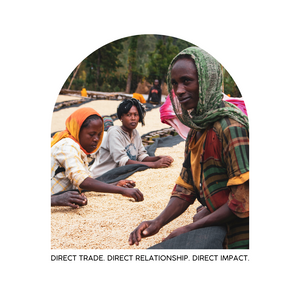What is Specialty Coffee?
Feb 28, 2021
Let's start at the beginning. There are three generations, or waves, in the coffee industry.
The first wave is things like Folgers and Maxwell House. You know, the stuff your dad put in his coffee pot before work.
The second wave is what a lot of us are familiar with. Starbucks, Peet's, and Dunkin Donuts are all great examples of second-wave coffee. They provide their customers with espresso and batch brewed coffee, as well as milk drinks with flavorings like vanilla, caramel, and hazelnut.
The third wave is the most recent development in the industry. This is specialty coffee. Specialty Coffee emphasizes the coffee itself and tends to stay away from most flavorings and even milk, depending on where you're grabbing a cup from. Most Specialty Coffee shops will highlight coffee brewed using a pour-over method and high-end espresso.
So what is Specialty Coffee?
Is it just an arbitrary phrase that someone came up with to look good on a marketing campaign? Or is there a more concrete definition? Well, according to the Specialty Coffee Association, the coffee needs to meet a set of standards at various points throughout its growing, roasting, and brewing process to be considered Specialty Coffee. One of those standards is the 100 Point Coffee Review Scale which, much like the rating systems used for beer and wine, gives the coffee a numerical value. Coffee that exceeds 80 points on the scale is considered a specialty grade.
What does this all mean for you? Why should you care about Specialty Coffee?
Well, I'm here to tell you! Let's start with taste. Many of us think of a dark, acidic, and bitter flavor profile when we think of coffee. It has become accepted as "the coffee taste" almost universally. There is, however, a problem with that identity we have given coffee. Coffee at its purest is a plant, the pit of a cherry specifically, and, the dark and bitter taste is not its natural flavor! When coffee beans are roasted with care, you'll be able to taste the true flavor of that coffee and even the region of origin. Roasters that sell Specialty Coffee prefer to roast their beans lighter to highlight the beautiful flavor notes that the beans have to offer. Flavors like tangerine, grapefruit, blueberry, and many more can be present in a black cup of coffee- all without any added flavorings! This keeps roasters honest about the freshness and overall quality of coffee they're providing. The darker you roast your coffee, the more defects you're able to hide. Now that doesn't mean all dark roasts are bad. But if you start to taste any smoky, ashy, or acrid flavor in your cup, the Specialty Coffee Association does categorize those notes as burnt on the Coffee Tasters Flavor Wheel.
Specialty Coffee encourages a healthier relationship between the farmers and consumers.
With higher expectations for sourcing and taste, the consumer becomes well informed of where their coffee is coming from. On the other side of the bean, with the help of direct trade importers, farmers can earn a more-than-fair-wage for their product, increasing quality of life for them and their families.
Coffee is the second most traded commodity on the planet next to crude oil, and number one when it comes to consumable products overall. What this means is there are a LOT of varieties of your favorite drink out there, and many more to be discovered!
The world of Specialty Coffee is a blossoming one that wants to highlight the very best coffee in the world to shine a light on a new standard of taste, trade, and community.
I encourage you to start exploring coffee in a new way, to think of the hard work and dedication behind each sip of your favorite drink, and to seek out coffee that honors honesty and transparency in everything.

